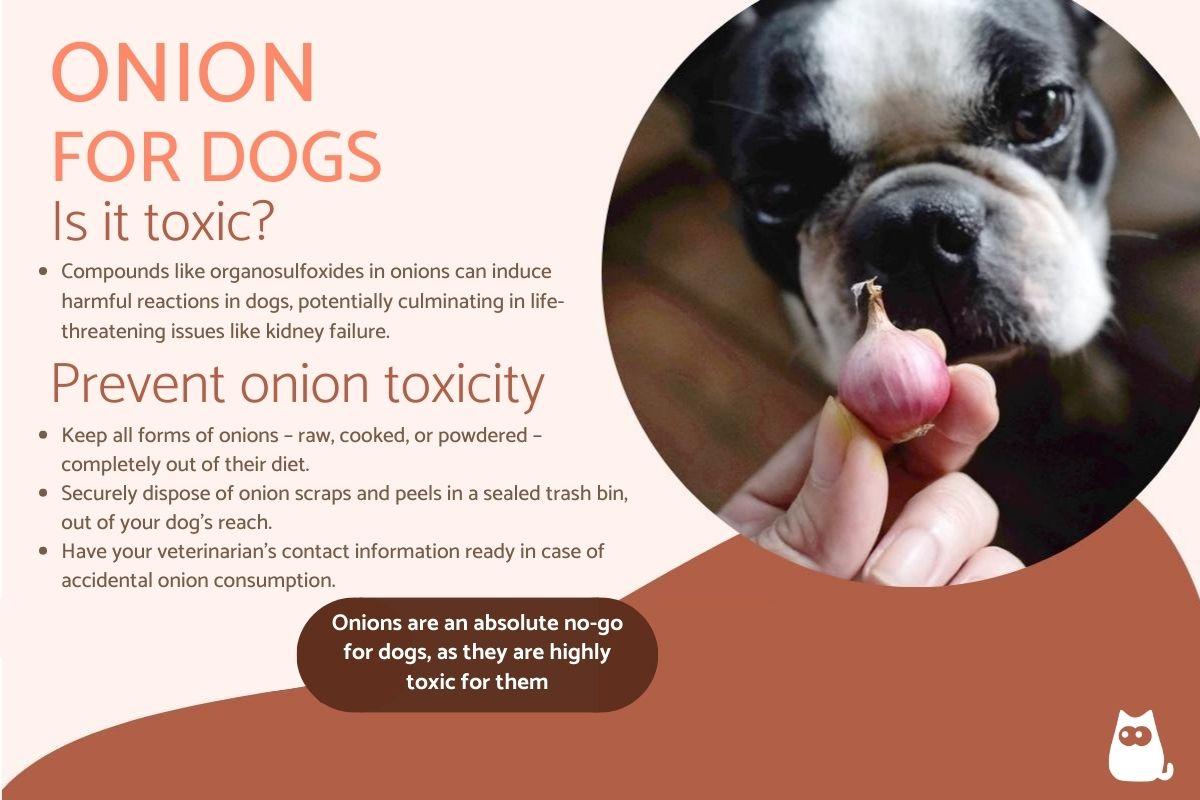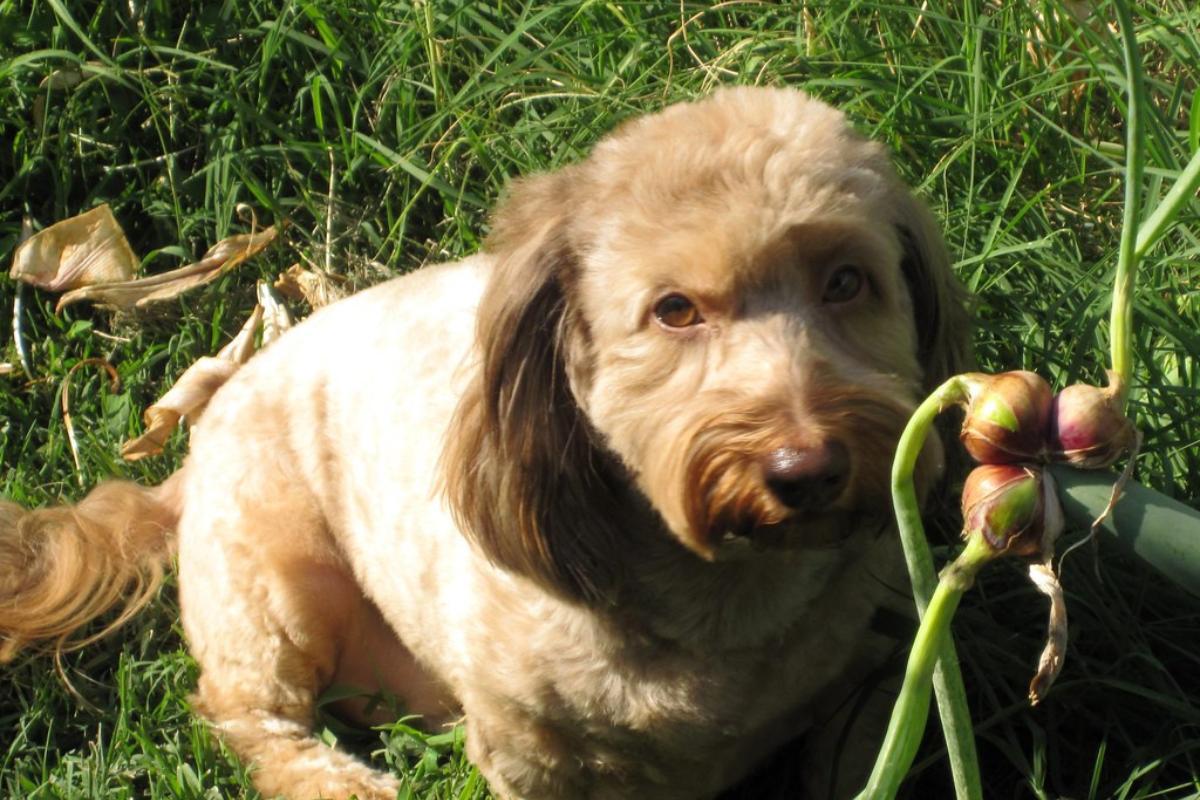Can Dogs Eat Onions? - Onion Poisoning in Dogs



See files for Dogs
Onions can pose a serious health risk to our canine companions, despite their appearance as a seemingly harmless vegetable. Even though onions add a rich flavor and aroma to dishes, their compounds are highly toxic to dogs. But what exactly happens when a dog consumes onions? Why is it that something so benign for us can lead to a potentially life-threatening situation for our four-legged companions?
In this AnimalWised article, we'll delve into the reasons why onions are unsafe for dogs, explore the potential consequences of onion consumption, and provide essential insights on how to prevent any accidental exposure.
Can dogs eat onions?
The answer couldn't be more straightforward: absolutely not. Onions are an absolute no-go for dogs, as they are highly toxic to these animals' systems.
Even a mere smidgen of fresh onion (around 15 to 30 grams per kilogram of body weight) can ignite a dangerous bout of poisoning in dogs. It's essential to grasp that the severity of the poisoning corresponds directly to the amount of onion consumed—the more they ingest, the more critical the outcome.
What adds another layer of complexity is that specific breeds possess a heightened vulnerability to onion poisoning. For instance, the Akita Inu, Shiba Inu, and Jindo breeds are particularly susceptible. This susceptibility stems from hereditary traits within these Asian breeds, such as elevated concentrations of potassium and diminished glutathione—a natural antioxidant.
Can dogs eat cooked onions?
Now, you might wonder if cooked onions are any safer for our pets. The short and unequivocal answer remains—no. Whether onions are raw, cooked, or dehydrated, they pose the same danger. Cooking, drying, or any other culinary technique doesn't nullify the toxic impact of this vegetable.
Why is onion bad for dogs?
Exploring the reasons behind why onions pose a threat to canines is not only fascinating but also of paramount importance. The culprits behind this toxicity are compounds aptly named "organosulfoxides." To be more precise, onion harbors an array of these substances: n-propyl disulfide, n-propyl, diverse sodium thiosulfates, trans-1-propenyl thiosulfate, and cis-1-propenyl thiosulfate. These are no benign elements – they possess a knack for swift absorption in the intestinal tract, followed by metabolism that births potent, highly reactive oxidizing agents.
These agents embark on a harrowing interaction with a dog's red blood cells. A chain reaction of oxidative harm is instigated, ultimately culminating in the rupture, or lysis, of these crucial blood cells. This chain of events sets the stage for a condition known as hemolytic anemia, taking on a distinctive mark – the formation of Heinz bodies that becomes remarkably pronounced.
However, there's more gravity to this predicament than meets the eye. The worst-case scenario paints a picture of hemolytic anemia that barrels into acute renal failure. This is where matters turn dire, venturing into territory that can potentially seal a dog's fate.
Explore symptoms, treatment, and prevention of garlic and onion poisoning in dogs in this other article.

Onion poisoning in dogs
The clinical presentation associated with onion poisoning manifests with typical symptoms indicative of an anemic process:
- Pale mucosa
- Tachycardia and tachypnea
- Lethargy
- Weakness
- Labored breathing
- Urine that appears dark, reddish, or brown
- Vomiting
- Diarrhea
- Abdominal pain
- Jaundice (yellowing of mucous membranes)
- Renal failure
It's pivotal to acknowledge that the manifestations of onion poisoning typically don't surface immediately. Instead, clinical indicators tend to surface over several days (ranging from 1 to 5 days). As a result, in certain cases, linking the clinical signs of poisoning to onion consumption can pose a challenge.
Should these signs manifest, it's crucial to promptly seek veterinary care; delve into our comprehensive guide on dog poisoning for specific symptoms and initial aid insights.
What to do if my dog has eaten onion?
If you suspect that your dog has ingested onion, no matter how minuscule the quantity, prompt action is imperative—make a beeline for a veterinary center without delay.
Although a targeted antidote for onion poisoning is currently unavailable, the key lies in initiating supportive actions. These interventions are precisely aimed at diminishing the oxidative effects on red blood cells and preventing potential kidney damage.
During the initial hours after onion consumption, when the dog hasn't yet shown visible symptoms, inducing vomiting might prove beneficial. However, it's crucial to underscore that this procedure should exclusively be conducted by veterinary experts, as it carries inherent risks for the animal's well-being. In the aftermath of vomiting cessation, administration of activated charcoal might also come into play.
When several hours have passed since ingestion, and previous efforts have proven ineffective, turning to symptomatic treatment becomes the necessary path. This approach might involve:
- Oxygen therapy
- Fluid therapy utilizing crystalloids
- Infusion of antioxidant vitamins (E and C)
Moreover, in instances characterized by severe anemia, the consideration of a blood transfusion becomes a practical and viable choice.
In essence, the key takeaway is that swift and expert intervention is absolutely crucial when dealing with onion ingestion.
Discover more about prohibited fruits and vegetables for dogs in other article.
How to prevent onion toxicity in dogs?
Preventing onion toxicity in dogs is a priority that requires vigilance and proactive measures.
Firstly, ensure that onions, in any form – raw, cooked, or powdered – are entirely absent from their diet. Storage is crucial; keep onions well out of your dog's reach to prevent accidental ingestion.
Disposing of onion scraps and peels requires care. Ensure they are placed securely in a sealed trash bin, inaccessible to your curious canine companion.
In the unfortunate event of accidental onion consumption, have your veterinarian's contact information handy. Timely communication is crucial for appropriate action.
This article is purely informative. AnimalWised does not have the authority to prescribe any veterinary treatment or create a diagnosis. We invite you to take your pet to the veterinarian if they are suffering from any condition or pain.
If you want to read similar articles to Can Dogs Eat Onions? - Onion Poisoning in Dogs, we recommend you visit our Other health problems category.
- European Federation of Pet Food Manufacturers (FEDIAF). Nutritional guides. Toxicity of onions and garlic in dogs and cats .
- Tang, X., Xia, Z., Yu, J. (2008). An experimental study of hemolysis induced by onion (Allium cepa) poisoning in dogs. Journal of Veterinary Pharmacology and Therapeutics; 31(2):143-159






